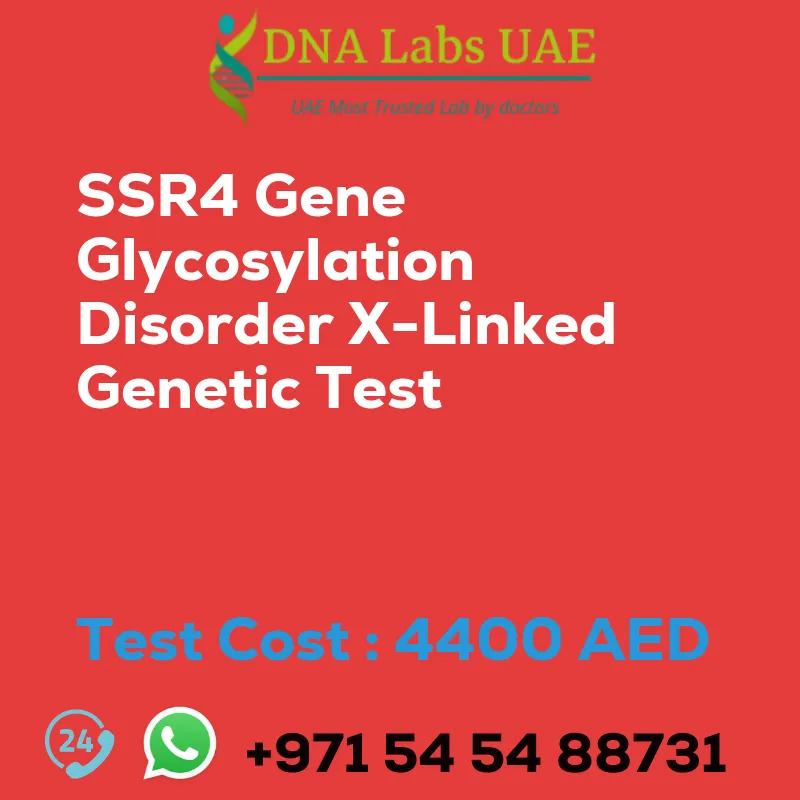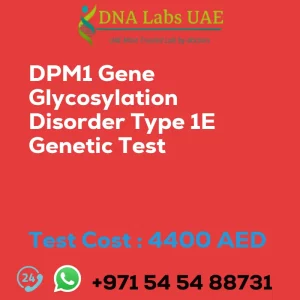SSR4 Gene Glycosylation Disorder X-Linked Genetic Test
Welcome to DNA Labs UAE, where we offer the SSR4 Gene Glycosylation Disorder X-Linked Genetic Test. This test helps diagnose a rare genetic disorder that affects the glycosylation process in the body.
Test Details
Glycosylation is the process of adding sugar molecules to proteins, lipids, or other molecules, which is essential for their proper functioning. When there is a mutation in the SSR4 gene, it can lead to impaired glycosylation and subsequent health issues. The SSR4 gene is located on the X chromosome, making the disorder X-linked. This means that the disorder primarily affects males, as they have one X chromosome and one Y chromosome. Females have two X chromosomes, so even if one of the X chromosomes has a mutation, the other healthy X chromosome can compensate for it.
Components and Price
The SSR4 Gene Glycosylation Disorder X-Linked Genetic Test is priced at 4400.0 AED. The test can be conducted using a blood sample, extracted DNA, or one drop of blood on an FTA card.
Report Delivery
After the sample is collected, the report will be delivered within 3 to 4 weeks.
Method
The SSR4 Gene Glycosylation Disorder X-Linked Genetic Test utilizes Next-Generation Sequencing (NGS) technology. NGS is a high-throughput sequencing method that allows for the simultaneous sequencing of many genes or even the entire genome. It can detect mutations or variations in the SSR4 gene that may be responsible for the disorder.
Test Type
The SSR4 Gene Glycosylation Disorder X-Linked Genetic Test falls under the category of Metabolic Disorders.
Doctor
This test can be requested by a General Physician.
Test Department
The SSR4 Gene Glycosylation Disorder X-Linked Genetic Test is conducted by our Genetics department.
Pre Test Information
Before undergoing the SSR4 Gene Glycosylation Disorder X-Linked Genetic Test, it is important to provide the clinical history of the patient. Additionally, a Genetic Counselling session may be conducted to draw a pedigree chart of family members affected by Glycosylation Disorder X-Linked.
Diagnosis and Management
Once diagnosed with SSR4 Gene Glycosylation Disorder, management and treatment options may involve symptomatic and supportive care. This can include therapies to address specific symptoms, such as physical and occupational therapy, speech therapy, or medications to manage seizures or other associated conditions.
It is important to consult with a genetic counselor or a healthcare professional who specializes in genetic disorders to discuss the specific implications of SSR4 Gene Glycosylation Disorder and the available testing and treatment options.
| Test Name | SSR4 Gene Glycosylation disorder x-linked Genetic Test |
|---|---|
| Components | |
| Price | 4400.0 AED |
| Sample Condition | Blood or Extracted DNA or One drop Blood on FTA Card |
| Report Delivery | 3 to 4 Weeks |
| Method | NGS Technology |
| Test type | Metabolic Disorders |
| Doctor | General Physician |
| Test Department: | Genetics |
| Pre Test Information | Clinical History of Patient who is going for SSR4 Gene Glycosylation disorder x-linked NGS Genetic DNA Test A Genetic Counselling session to draw a pedigree chart of family members affected with Glycosylation disorder x-linked |
| Test Details |
SSR4 gene glycosylation disorder is a rare genetic disorder that affects the glycosylation process in the body. Glycosylation is the process of adding sugar molecules to proteins, lipids, or other molecules, which is essential for their proper functioning. When there is a mutation in the SSR4 gene, it can lead to impaired glycosylation and subsequent health issues. The SSR4 gene is located on the X chromosome, making the disorder X-linked. This means that the disorder primarily affects males, as they have one X chromosome and one Y chromosome. Females have two X chromosomes, so even if one of the X chromosomes has a mutation, the other healthy X chromosome can compensate for it. To diagnose SSR4 gene glycosylation disorder, a Next-Generation Sequencing (NGS) genetic test can be performed. NGS is a high-throughput sequencing method that allows for the simultaneous sequencing of many genes or even the entire genome. It can detect mutations or variations in the SSR4 gene that may be responsible for the disorder. NGS genetic testing involves obtaining a DNA sample, typically through a blood sample or cheek swab, and sequencing the DNA to identify any variations in the SSR4 gene. The test can provide information about specific mutations or variations in the gene that may be causing the glycosylation disorder. Once diagnosed, management and treatment options for SSR4 gene glycosylation disorder may involve symptomatic and supportive care. This can include therapies to address specific symptoms, such as physical and occupational therapy, speech therapy, or medications to manage seizures or other associated conditions. It is important to consult with a genetic counselor or a healthcare professional who specializes in genetic disorders to discuss the specific implications of SSR4 gene glycosylation disorder and the available testing and treatment options. |








